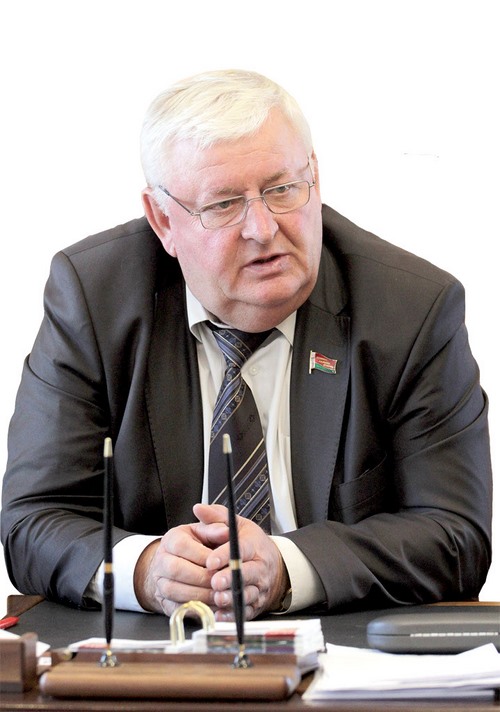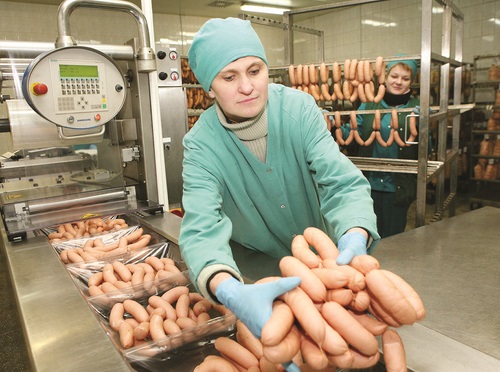Nikolay Radoman, Belarusian senator, responsible for economic cooperation with Russia

Photo: Vitaliy Pivovarchik
We must not decrease our level of interaction
Mr. Radoman, you participated in the 1st Forum of Regions in Minsk, and also in the 2nd Forum of Regions when it was in Sochi. What do you expect from the 3rd Forum of the Union State which will be held again in Minsk in June?
The Forums of Regions have already proved their importance; it is a useful form of co-operation between our countries. Each meeting gives new opportunities for dialogue with Russian colleagues on a mutually advantageous basis. For example, in Sochi, we established contacts with Amur Region. The delegation of the region has already visited Snov Agro-combine. I hope that in June our cooperation will reach a new scale. In total, about 300 contracts in various areas were signed at the last meeting, we expect similar from the Minsk forum.
This time we have invited visitors to the national agricultural exhibition ‘Belagro-2016’ to discuss the general agrarian policy, and an impressive display of agrarian and industrial effects is planned.
The 3rd forum will give a new impetus to the development of Russian-Belarusian relations. Other countries, such as Kazakhstan, may also join us in the future, to the benefit of all.
To agree for the sake of our mutual advantage
Russia is our main trading partner. We cooperate closely with Moscow and Smolensk, we actively expand our ties with St. Petersburg. We deliver meat, sausages, tinned meat and dairy products.
The competition in foreign markets constantly grows and adds to the difficulties in trading. We are continually sear-ching for new platforms to sell our goods. We have high hopes of the Eurasian Economic Union, including the common market of Belarus, Russia, Kazakhstan, Armenia and Kyrgyzstan. And also on the cooperation of the agrarians in these countries, in order to enter third markets together. It will be easier with combined efforts to win contracts under the flag of the Eurasian Economic Union.
Is it possible that a co-ordinated agricultural policy will exist within the limits of the Union State or EAEU?
Currently this is not a robust policy. It needs uniformity in its rules, as well as parity prices and identical conditions for the support of the agricultural sector and on production sales. As we’ve created the Union State and the EAEU, it is necessary to agree and substantiate a legislative base according to these agreements. We do not need to compete; we can complement each other.

Snov Agro-combine makes the best sausages. Photo: Belta
Perspectives for growth
Snov Agricultural Production Complex is the leader in the agriculture of Belarus. How was it possible to achieve such a level of effectiveness?
I am only the third head in Snov for the 65 years of its history. The Hero of Socialist Labour, Yakov Aleksankin, headed it for 37 years. Then the Hero of Belarus, Mikhail Karchmit, came next. Snov is my life. I was born here, studied at school, and 39 years ago after graduation I returned. In our collective people are committed to their work. Fathers and sons, mothers and daughters work here. The serious attitude to work and continuity is the secret of our success.
During recent years we have been consolidating, annexing neighbou-ring unprofitable enterprises. It is a world trend for development in agriculture, and in our country many agricultural and industrial concerns do this as small companies cannot afford a fleet of highly effective, powerful, far-reaching machinery. They cannot build modern complexes and compete with the agricultural giants.
‘Snov’ was one of the first in Belarus that turned to a scheme of specialisation. In the fields we grow forage for farms. We make and process meat and milk. Snov’s tinned stewed meat is well-known and loved far beyond Belarus.
Economic indicators of this agricultural production complex are at the level of European indicators. Are there reserves of growth?
For almost three five-year programmes, we have managed to increase meat manufacture 2.6 times, milk by 2.8. Our livestock is currently at 14,000 cattle and 36,000 pigs. Productivity is very high: last year milk yields were almost 10,000 litres for one cow, and pigs gained weight by 780 grams a day.
But there is room for improvement. Our experts constantly study, experiment and carry out breeding work. We search for the best ideas in Belarus and abroad. We actively cooperate with science institutes and research-and-production centres. Every year we sow testing fields with hundreds of grades of various crops. We look to see which seeds are suitable for us. We experiment in stockbreeding. Of course, not all bears fruit but it’s important to continue to develop.
What about discipline in the collective?
Production discipline is the basis for everything. After all it is technology. A worker does not need to invent anything; they only need to operate the machinery. We have already forgotten the times of ‘fight for crops’. Because a sowing or harvest campaign is a planned task in which reserves of fuel and spare parts are prepared in time. As a result, there are no emergency situations. Everything that we earn we invest in technology, the development of the social sphere and human capital.
Young people never want to leave here
How did it happen that young people almost never move from Snov into the big cities?
Living conditions in the agro-city are no worse than in the city. We build comfortable accommodation. Last year, 59 families of workers of the agro industrial complex celebrated their house warming. The waiting list for accommodation was reduced to 30 people. This year it will be reduced by a further third. The complex has 1,900 workers, and there is a queue for each working place.
We have a good school, a kindergarten, chain stores, including two branded stores with ‘special’ prices for our own products. Mobile shops visit remote villages every other day. We have a good consumer services centre. The city has a wonderful Recreation centre, the library of which is a centre of attraction for adults and children. Musical school, arts school, sports groups work there. All have the opportunity to go to the pool, fitness centre and gyms, all nearby. It must be said that even in Minsk not every resident has such fantastic infrastructure in their own district.
By German Moskalenko











